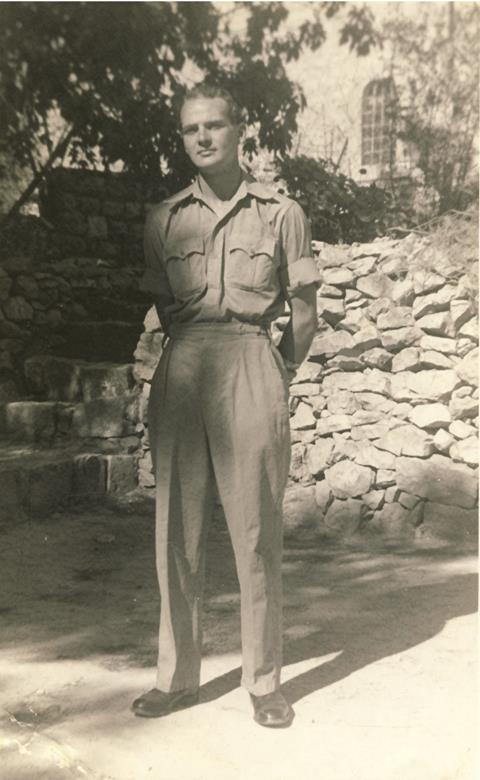When Covid-19 shattered the aviation industry, easyJet engineer Mark Draper was put on furlough. It was the start of a journey that would lead his family halfway across the globe
![20220822_122704[1]](https://d17xjl6rg4e8ic.cloudfront.net/Pictures/480xany/6/6/6/30666_20220822_1227041_239779_crop.jpg)
A love of aviation and Jesus are in Mark Draper’s blood. The story goes back to 1956, when Mark’s grandfather, Leslie, helped assemble the first Mission Aviation Fellowship (MAF) Cessna aircraft. Leslie was a British Airways engineer and MAF was a fledgling aid organisation, set up in the aftermath of the second world war to fly aid to isolated communities inaccessible by other means.
The Cessna 180 Skywagon had arrived from America at Heathrow Airport in a crate. Leslie and a team of volunteers from BA’s Christian Union were charged with reassembling it, before Betty Green, one of the few female aviators of her time, flew the aircraft to Sudan.
Today, MAF operates a worldwide fleet of more than 120 aircraft, serving 2,000 aid, development and mission organisations across 26 countries. It transports aid, medical supplies, volunteers and workers to some of the most remote regions on earth, bringing help and hope to people in many of the world’s poorest communities.
“I grew up with MAF in my life,” Mark says. “My grandad was always so excited about their story, because his Christian faith was such a big part of his life and so were aeroplanes. My grandparents always supported MAF financially. I’d often read their Flying for Life magazine and think: One day, I want to do that!”
In God’s time
“I wanted to fly for MAF more than anything,” Mark explains, “but God had other plans.” Because of his colour blindness, Mark couldn’t become a pilot, so he pursued a career in engineering instead: “If I can’t fly them, I might as well fix them.”
In the early days of their marriage, Mark and his wife, Steph, often talked about the possibility of one day working for MAF. “But it never quite seemed like the right time, you know?” Between Mark’s training to become an engineer, Steph qualifying as a midwife and having three children, “it just never quite lined up”.
When Covid-19 hit the UK, and lockdown grounded the aviation industry, Mark was working for easyJet as an engineer. Along with thousands of others, he was put on furlough. “It was a really tough time,” he says. “We were seeing pilots, engineers and cabin crew laid off. You were constantly thinking: Any minute I’m going to get a phone call saying: ‘I’m really sorry, we just don’t need you any more.’”

Making it count
One day, while praying about his future, Mark felt drawn to the MAF YouTube channel. There, he saw a video commemorating the life of Joyce Lin, a pilot who had recently died in a plane crash while delivering Covid-19 supplies in Indonesia. “She was talking about how she was able to use the skills God had given her to bless other people and I just felt something stirring inside of me,” says Mark. “God was reigniting what I felt as a teenager. I felt him say to me: ‘If you want your life to count for something, make an application to MAF.’
“I hadn’t felt this strongly about it in years,” he explains. “If I’m honest, it was something I had put to the back of my mind.” But now that God had stirred the calling, Mark was worried about his wife’s response. “I thought: There’s no way Steph is going to go for this.
“I said to her: ‘You remember we always talked about MAF when we first got married? I think now’s the right time to make an application.’ And to my utter astonishment, she said: ‘I think you’re absolutely right.’”
![20230208_073417[1]](https://d17xjl6rg4e8ic.cloudfront.net/Pictures/480xAny/6/6/5/30665_20230208_0734171_294384.jpg)
Called to serve
After discussing it with their three daughters, aged eleven, nine and five, the couple began the lengthy application, which included a long prayer and discernment process, and a term at Bible college. Finally, in early 2023, they made the move to Kampala, Uganda’s capital city.
“We’d always felt that we were called to them [MAF] as an organisation, rather than to a particular place,” says Mark. “So we said: ‘Send us where you need us.’”
From Kampala MAF’s six aircraft support more than 200 organisations across northern Uganda and South Sudan, supplying medical equipment, transport and aid to remote areas where drought and famine are badly affecting local communities. Life is tough for local people, says Mark. “In the UK, we have so much. You come here and see how little people have, and yet they still seem to smile. It’s amazing really; we can learn so much.”
we said: ‘Send us where you need us.’
The Drapers may have felt God’s presence with them in the move, but the decision to leave the UK was nonetheless “an emotional rollercoaster,” says Mark, especially for his young children. And whether it’s working out how to pay bills, or avoiding the livestock that roam the roads at will, “almost every single thing is different”, says Mark of life in Africa. “It can be quite draining sometimes, because you really have to think about everything. There’s nothing you can do on autopilot.”
The biggest lesson Mark has learned is the need to rely on God more. “As engineers, we pride ourselves on being able to fix things,” he says. “But there are just so many scenarios, on a daily basis, where I feel God saying to me: ‘You need to rely on me, because you’re not going to get through this by yourself.’ I think you’d be overwhelmed quite quickly if you were trying to do it all on your own.”
After telling his parents about their move to Uganda, Mark’s next priority was to speak to his grandmother. “My granddad passed away in 2011, but the first thing my grandma said was: ‘Your granddad would be so pleased.’ It’s a bit of a fulfilment of a family dream, I guess.”







































No comments yet